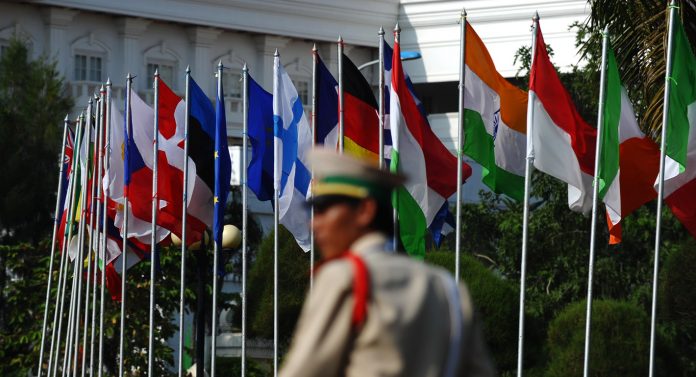The Asia-Europe Meeting is a high-level political dialogue held every two years to improve relations between participating states. This year’s conference, hosted in Brussels on October 18-19, marks the twelfth gathering of what is now a 53-member group, including geopolitical heavyweights like China, France, Germany, India, and Russia. Collectively, ASEM partners represent 55 percent of global trade, 60 percent of the world population, and 65 percent of global GDP.
In this Q&A, Carnegie experts explain the issues at the top of the ASEM agenda.
Source: “Asia-Europe Meeting (ASEM), 18-19/10/2018,” European Council
What’s the context around this year’s ASEM Summit?
Lizza Bomassi: The 2018 ASEM conference offers a chance to make headway on some big-ticket items on the Europe-Asia agenda. In theory, the high-level meeting is set to cover a lot of ground on several pressing global issues—everything from trade and investment to climate to security—at a time when the United States’ interest in multilateralism is on the wane. The question is whether ASEM partners will take advantage of this opportunity.
Europe’s attention risks being distracted by domestic gerrymandering and a litany of internal challenges—including Brexit, Italy’s perceived insubordination, rising East-West tensions, and a difficult relationship with Turkey, to name a few. Meanwhile, the Asian states will be driven by their own, individual priorities: Japan on finalizing its trade pact with the EU; South Korea on dealing with its belligerent neighbor to the north; India on its upcoming elections; not to mention China’s preoccupation with the escalating global trade war.
The areas where common ground could lie may prove too thorny to reach solid consensus, at least in this format. It’s likely that countries will show some unity on Iran and North Korea, if only to demonstrate that good old-fashioned diplomacy still works. The connectivity debate that Erik Brattberg discusses below will be the most difficult because there’s little opportunity for advancement on some of the key sticking points, especially between Europe and China.
Ironically enough, the one place where Europe and Asia could be on the same page is on saving the WTO. Despite growing views to the contrary, the WTO is still the only viable institution that provides a rules-based mechanism for dealing with global trade disputes.
—Lizza Bomassi is the deputy director of Carnegie Europe
What does the EU hope to achieve from these high-level talks?
Erik Brattberg: A top priority for the EU at the summit is…


